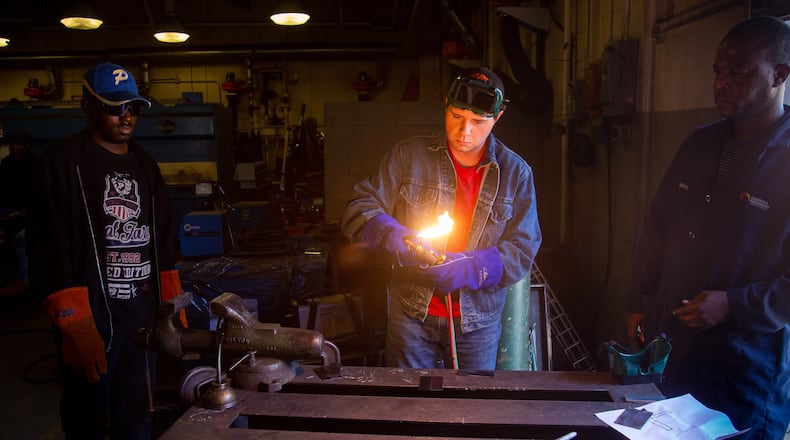Metro Atlanta's economy added 11,800 jobs last month, the strongest December in more than five years, despite weakness in several key sectors that could presage a tougher 2020.
The net gain for all of 2019 was 66,700, the most since 2016, even as the jobs expansion stalled in other parts of Georgia, according to preliminary data.
Growth was solid in white-collar corporate and tech jobs, as well as in blue-collar warehouse work, although there were cutbacks in temp jobs and manufacturing, the state's labor department reported Thursday.
The unemployment rate ticked up to 2.7% from 2.6% in November, mostly because the labor force surged by more than 20,000 people, not all of whom found work, the department said.
Last week, officials reported the state’s unemployment rate falling to a record-low 3.2% for December, despite modest growth of 3,900 jobs statewide last month.
"This was a very positive year for the state," said Mark Butler, the state's labor commissioner. "We saw over-the-year growth in almost every (metro area)."
Atlanta typically accounts for the lion’s share of Georgia’s jobs, often making up for soft hiring elsewhere — but lately it’s been responsible for even more than that.
While the figures are subject to a more careful count, the initial report has metro Atlanta adding as many jobs as the entire state did during the past year. So, while other areas did add jobs, others likely shed jobs, potentially putting the 2019 net job gain at zero outside metro Atlanta.
Several sectors in metro Atlanta posted a healthy December:
— Transportation and warehousing added 2,300 jobs.
— Corporate jobs were up 4,900 jobs, including 3,200 in science and technology.
— Construction added 300 jobs, despite the cold, growing by 4,300 jobs during the year.
These were Georgia’s fastest-growing job fields since 2014.
The labor force in the region has grown very slowly, so workers with good skills are in demand after a decade-long economic expansion has pushed the employment rate to record lows.
Jeffrey Dorfman, the state fiscal economist for Georgia and a professor at the University of Georgia, recently warned that the shortage of workers could threaten the expansion.
"One of our biggest issues is that the companies can't find workers," said Nathan Humphrey, director of the National Federation of Independent Business in Georgia. "Almost across the board, I hear this."
Even in Atlanta there was both strength and weakness.
Most notably struggling was staffing – the sector made up of companies that provide temporary workers to a range of businesses and factories. The sector lost 1,000 jobs during December and 7,300 jobs during the year, according to the Georgia Labor Department.
"Temp jobs can be an early warning about the strength of the economy," said Rajeev Dhawan, director of the Economic Forecasting Center at Georgia State University. "Because if you don't want to hire temps, you won't be hiring full-time workers. When temp starts to drop, that can mean a pause is on, or it could be real trouble."
Executives from staffing companies said they see the dip as temporary.
Kim Wallace, executive vice president at Duluth-based Hire Dynamics said the calendar cut the time consumers had for shopping, trimming the need for temp workers in stores and in distribution. Moreover, "consumer behavior has changed," she said. "People shop online and wait for post-holiday sales to do it."
She said she expects the sector to bounce back this year.
But many staffing companies place workers in manufacturing, which also shed jobs during the month. Because many manufacturers rely on imports and exports, Ryan Hansen, metro market manager at staffing company Robert Half, thinks global factors are at play.
The nation’s continuing trade disputes – especially with China – have added uncertainty to long-term planning by companies with investments in Asia, he said. He said his company works with a number of logistics companies that have frozen hiring until tariff disputes are resolved.
Metro Atlanta unemployment rate
High: 10.6% (Feb. 2010)
Low: 2.6% (November, 2019)
Current: 2.7% (December, 2019)
Sources: Georgia Department of Labor, Bureau of Labor Statistics
Metro Atlanta job growth for year
2014: 104,300
2015: 71,000
2016: 79,900
2017: 56,900
2018: 52,800
2019: 66,700
Sources: Georgia Department of Labor, Bureau of Labor Statistics
Metro Atlanta job growth, December
2014: 8,300
2015: 10,300
2016: 6,200
2017: 500
2018: 8,600
2019: 11,800
Sources: Georgia Department of Labor, Bureau of Labor Statistics
About the Author




